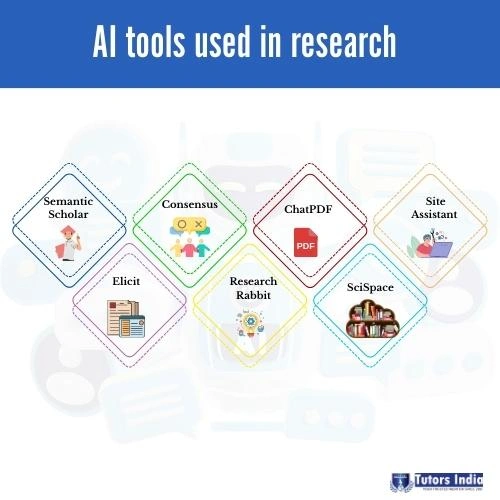Artificial Intelligence (AI) Tools in Scientific Research
Advent and Rise of Artificial Intelligence
- The concept of Artificial Intelligence or AI was first introduced in the 1950s. Although it seemed promising, the research and development on AI remained stagnant due to technological limitations like data processing capacity and handling various types of data.
- There has been a growing interest in knowing what artificial intelligence is. Despite numerous publications, conferences, and applications, it was difficult to define artificial intelligence precisel
- Artificial intelligence can be commonly understood as “biopsychological potential to process information to solve problems or develop products that are of value in culture.”
- To be more specific, artificial intelligence can be defined as the ability of a system to interpret external data, learn from data correctly and use those learnings to achieve specific goals and tasks.
- AI often uses external sources of information, such as the Internet of Things (IoT) and other big data sources, to identify patterns and rules by using machine learning which describes methods that help computers learn (Kaplan, 2019).
- The evolving field of science and technology led to the resurgence of artificial intelligence that helped address past limitations.
- Artificial intelligence is used in multiple fields like business, computer science, biomedicine, supply chain management and healthcare (Venkatesh, 2021).
- Artificial intelligence is increasingly gaining importance in the field of scientific research. Check out our study guide to learn more about how AI tools can help in scientific research.

What are the Various AI tools used in Scientific research?
AI tools can help make scientific research easier. The following are some tools used by academic researchers and students for their dissertations: –
- Semantic Scholar
Semantic Scholar is an AI-powered search and discovery tool which allows researchers access to more than 200 million academic research papers sourced from publishers. Semantic Scholar offers a one-line summary of each paper, which helps researchers prioritise publications for studying in-depth. Additionally, the in-built AI algorithms help identify and recommend related papers based on the history and identify hidden links between research topics.
- Consensus
Consensus runs on GPT 4 and uses Natural Language Processing (NLP) and machine learning to analyse scholarly content. This technology makes it easier for researchers to gain access to expert knowledge. An extra AI model evaluates publications most relevant to the question and presents the findings.
- ChatPDF
ChatPDF is an AI application wherein the researchers can upload a PDF document and interact with it to seek answers. One need not sign up or log in for using ChatPDF. A next-generation AI model similar to ChatGPT is used in ChatPDF.
- Scite Assistant
Scite Assistant is an AI-powered app that helps to give real citations to published papers. Scite allows users to collaborate on essays and research papers and locate evidence to support and contradict their arguments. Users can use the application to find accurate information, browse through millions of research papers, and develop research proposals or essays.
- Elicit
Elicit is an artificial intelligence research assistant that assists scholars with brainstorming, research, and writing. It helps generate ideas, find relevant information and structure arguments. Presentations and posters can also be developed with Elicit.
- Research Rabbit
Research Rabbit is an AI application that adds research papers, creating a ‘collection’. These collections enable the software to learn about the user’s preferences, resulting in new relevant recommendations. In addition, Research Rabbit allows users to visualise the scholarly network of articles and co-authorships, allowing them to track the work of a specific topic or author and study deeper into their research.
- SciSpace
SciSpace is an artificial intelligence-powered portal that assists researchers in publishing their work. It offers a one-stop shop for all aspects of manuscript submission, peer review, and publication. SciSpace can help researchers save time and publish their findings more quickly.
Maintaining responsibility while using AI
Care should be taken to prevent plagiarism while using AI in research. One must implement the following steps to prevent plagiarism and maintain academic integrity:
- Seek ethical AI tools
- Comprehend the purpose of AI research tool
- Paraphrase information or use quotations if it is a definition
- Cite sources
- Proofread and edit AI-generated content
Conclusion
Artificial intelligence is adopted and widely used in multiple domains, including research. AI tools can help researchers save time and improve the quality of their work. Popular AI tools in research include Semantic Scholar, ChatPDF, SciSpace, Elicit, Scite Assistant, Research and Consensus. At the same time, it is important to maintain academic integrity, and researchers must take some steps to prevent plagiarism while using AI tools.
How Tutors India can help
We offer assistance with dissertations for Master’s students specialising in multiple fields- like arts, law, business management, medicine, life sciences and engineering. Our team helps computer science students with dissertation coding, programming and algorithms, AI and machine learning. We ensure the algorithms are free from errors and the dissertations are free from plagiarism, and abide by the university guidelines.
To know more about how a dissertation is written in various disciplines, check out our dissertation examples.
References
- Andreas Kaplan, Michael Haenlein, Siri, Siri, in my hand: Who’s the fairest in the land? On the interpretations, illustrations, and implications of artificial intelligence, Business Horizons, Volume 62, Issue 1, 2019, Pages 15-25.
- Venkatesh, V. (2021) “Adoption and Use of AI Tools: A Research Agenda Grounded in UTAUT,” Annals of Operations Research, forthcoming.

 Previous Post
Previous Post Next Post
Next Post